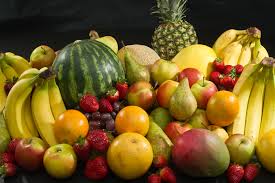fruit
英 [fruːt]
美 [fruːt]
- n. 水果;产物
- vi. 结果实
- vt. 使……结果实
- n. (Fruit)人名;(法)弗吕;(英)弗鲁特
使用频率:

记忆方法
将“fruit”与“fruitful”联系起来,想象一棵树结出了丰富的“fruit”,这样的画面可以帮助你记住单词“fruit”的含义是“水果”。
以上内容由AI生成, 仅供参考和借鉴
中文词源
fruit 水果
来自fructus, 果实,来自PIE*bhrug, 农业收成,收获,进一步来自PIE*bher, 裂开,词源同bore, break. 即果实成熟裂开之意。原指土地上的各种收成,后固定指水果。
英语词源
- fruit
-
fruit: [12] English acquired fruit via Old French fruit from Latin frūctus, a source more clearly on display in fructify [14], fructose [19], etc. The underlying meaning of the Latin noun seems to have been ‘enjoyment of that which is produced’, for it came, like frūx (source of English frugal), from a base which also produced the verb fruī ‘enjoy’.
By classical times, however, it had passed from ‘enjoyment’ to the ‘product’ itself – the ‘rewards’ of an enterprise, the ‘return’ on an investment, or the ‘produce’ obtained from the soil or from farm animals. When it reached English this latter meaning had narrowed down somewhat, but it was still capable of being used far more broadly, for any ‘edible vegetable’, than we would do today, except in certain archaic expressions such as ‘fruits of the earth’.
The modern restriction to the edible reproductive body of a tree, bush, etc dates from the 13th century. English retains, of course, the more general sense ‘product, result’, although this is now usually expressed by the plural fruits.
=> fructify, frugal - fruit (n.)
- late 12c., "any vegetable product useful to humans or animals," from Old French fruit "fruit, fruit eaten as dessert; harvest; virtuous action" (12c.), from Latin fructus "an enjoyment, delight, satisfaction; proceeds, produce, fruit, crops," from frug-, stem of frui "to use, enjoy," from suffixed form of PIE *bhrug- "agricultural produce," also "to enjoy" (see brook (v.)). The Latin word also is the source of Spanish fruto, Italian frutto, German Frucht, Swedish frukt-.
Originally in English meaning all products of the soil (vegetables, nuts, grain, acorns); modern narrower sense is from early 13c. Also "income from agricultural produce, revenue or profits from the soil" (mid-14c.), hence, "profit," the classical sense preserved in fruits of (one's) labor. Meaning "offspring, progeny, child" is from mid-13c.; that of "any consequence, outcome, or result" is from late 14c. Meaning "odd person, eccentric" is from 1910; that of "male homosexual" is from 1935, underworld slang. The term also is noted in 1931 as tramp slang for "a girl or woman willing to oblige," probably from the fact of being "easy picking." Fruit salad recorded from 1861; fruit-cocktail from 1900; fruit-bat by 1869.
权威例句
- 1. I tend to stick to fresh fruit for pudding.
- 我一直坚持用新鲜水果做甜点。
- 2. The following summer the peach tree was laden with fruit.
- 第二年夏天桃树就结满了桃子。
- 3. Eleanor's work among the women will, I trust, bear fruit.
- 我相信埃莉诺所做的工作会在妇女中有所成效。
- 4. When the fruit is mushy and cooked, remove from the heat.
- 当水果变软煮好后,就从火上端下来。
- 5. His room was jam-packed with fruit, flowers, gifts etc.
- 他的房间里堆满了水果、鲜花及礼品等。
